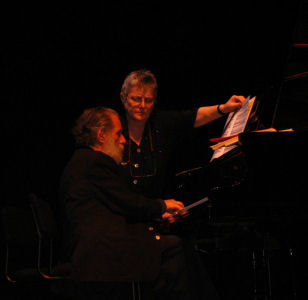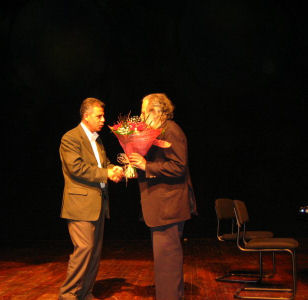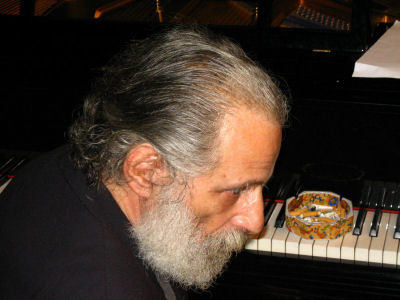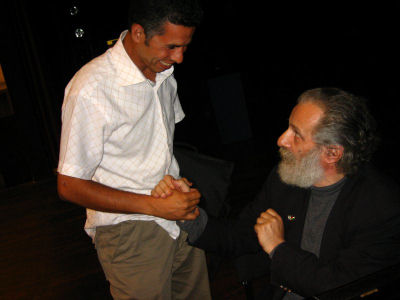
OCTOBER 2005
Music
in the service of Bil'in and its struggle for
survival
The protest concerts in Bil'in and Ramallah by pianist Jacob Allegro Wegloop were covered by Gush Shalom with photos and video (see hereafter). But first, the interview with the Dutch musician as it appeared prominently in the Jerusalem Post.
Holocaust survivor to give concert in Ramallah in support of Palestinians
Nathan Burstein, Sep. 20, 2005 Jerusalem Post
(...) Like his
departure, his recent return to Israel was inspired by
conflict. "My reason for coming back was the way
people are treating the Palestinians. I feel that people
like me who have suffered a lot do not have the right to
let other people suffer as well." Asked if he
saw a similarity between the situation of contemporary
Palestinians and Jews during the Holocaust, Allegro was
careful to draw a distinction. The two situations
"are absolutely not similar," he said,
"absolutely not yet. But I'm afraid they
[eventually] could be."
Full text
of interview :
Holocaust survivor to give concert
in Ramallah in support of Palestinians
By Nathan Burstein
Jacob Allegro, a Jewish pianist who survived the Holocaust as an infant, will perform Tuesday evening in Ramallah to "help create a better life for a people living under occupation." The concert follows a "protest recital" last Friday in Bil'in, a West Bank village that plays host to weekly demonstrations against the security barrier and Israel's presence in the West Bank.
Born in 1943 in Amsterdam, Allegro is in Israel for the first time since the mid-1970s, when he toured the country with his foster father, an Orthodox Jew who spent much of the Nazi occupation of Holland living homeless and without legal papers in Amsterdam.
Allegro's own parents were captured by Dutch collaborators and died in Auschwitz soon after his birth, and he spent the remaining years of the war in the care of members of the Dutch underground.
The pianist said he became interested in immigrating to Israel early in his childhood.
Trained at the Conservatory of Amsterdam, Allegro moved to Jerusalem in his early twenties to play for the city's Voice of Israel radio orchestra (now the Jerusalem Symphony Orchestra), but returned to Amsterdam in 1966 in response to tensions between Ashkenazi and Sephardi Jews. He played in concert halls throughout Holland and Western Europe in subsequent years, and currently is based at the Schumann House concert hall in the German city of Zwickau.
Like his departure, his recent return to Israel was also inspired by conflict, he said. "My reason for coming back was the way people are treating the Palestinians. I feel that people like me who have suffered a lot do not have the right to let other people suffer as well."
Asked if he saw a similarity between the situation of contemporary Palestinians and Jews during the Holocaust, Allegro was careful to draw a distinction. The two situations "are absolutely not similar," he said, "absolutely not yet. But I'm afraid they [eventually] could be."
Friday's protest recital in Bil'in came about through Allegro's friendship with members of the Gush Shalom peace group. The recent donation of a piano to Bil'in provided an obvious way for the musician to express his opposition to Israel's presence in the West Bank. Tuesday's 7 p.m. performance in Ramallah's cultural center was organized after the head of Bil'in's protest committee, Muhammad al-Khatib, contacted the Palestinian Culture Ministry about arranging a concert.
"We wanted to create music, not the sound of conflict," said Khatib. "Palestinian and Israeli activists suggested doing another night of music in Ramallah for the same cause and with the same meaning – against the occupation." Bil'in, 16 km. from Ramallah and 20 km. from Tel Aviv, "connects peace activists" in the two cities, he said.
Construction of the security barrier has cut the town in half, with 60 percent lying on the Israeli side of the structure.
Allegro plans to play works by Schubert, Beethoven and Chopin Tuesday night, saying that the selection was made for "the simple reason that I like them a lot." He said he'll also play the Palestinian anthem, "Biladi, Biladi" ("My Land, My Land"), if it's requested, as he did at the Bil'in demonstration. He said he would "certainly" be willing to play Hatikva in other settings. "If people ask me, why not?"
Allegro doesn't plan any other performances before his return to Europe later this week, but his support of Gush Shalom has made an impact on activists, Khatib said. "It tells us that we are doing the correct thing," he said, "and that we will free ourselves in this popular and non-violent way."
While he says his ultimate hope would be for the establishment of a binational state for Israel and the Palestinians, Allegro recognizes that "there's a difference between what I want and what is possible."
The trip to Israel has made him more receptive to the idea of making further visits in the future, and he said he'll return if invited back to play for Gush Shalom or other peace groups.
"In this way I am still an idealist," he said, "and I believe that music can give moments of happiness and peace. That's probably quite naive, but I still believe in it."
http://www.geocities.com/toi_billboard/JP_Allegro_Ramallah.htm
TOI-Billboard
- September 23, 2005
Beethoven For Peace
After giving an open-air protest-concert in Bil'in
village on a day of stormy demonstrations, the famous
Dutch pianist, Jacob Allegro, gave a similar concert in
Ramallah. The mission he undertook when he came to the
country, as a guest of Gush Shalom, is to protest against
the occupation and bring people of both sides together.
In the impressive new Culture Palace of Ramallah, where
Daniel Barenboim and his orchestra had played some weeks
ago, Allegro gave a recital of works by Schubert, Chopin
and Beethoven, under the auspices of the Bil'in struggle
committee and the Palestinian Ministry of Culture.
A Palestinian television personality, who introduced the
maestero, emphasized the fact that he is a Holocaust
survivor. In his response, Allegro said that he rebels
against all injustice.
The local audience mingled with the Israeli guests, who
had come through the Kalandia checkpoint. The emotional
meeting highlighted the close relations between the
Palestinian public and the Israeli peace activists. It
continued long after the concert, with the participation
of the pianist, until close to midnight.

Allegro playing. Turning the pages: Beate Zilversmidt.

Representative of the Palestinian Ministry of Culture
offering flowers.

During interval between pieces.

Allegro addressing the audience.

Muhammad Khatib of the Bilin struggle committee thanking
the maestro
Photos: Rachel
Avnery
Schubert in Bil'in - a New Kind
of Demonstration
Please click here
to watch the video
When the sun rose Friday (16.9.05) on a new day of
demonstrations in Bil'in, the sound of a piano was
suddenly heard among the homes and olive trees of the
village - several hours before the usual music of tears
gas grenades, stun grenades and rubber bullets.
The idea was born when the Dutch pianist, Jacob Allegro
Wegloop, a veteran supporter of Gush Shalom, offered to
come to Israel and play for peace and against the
occupation. Allegro, born in 1941, is an orphan of the
holocaust.
This inspired Gush activist Beate Zilversmidt, who is of
Dutch origin, to make an original proposal. Recently, the
family of "Anarchists Against Fences" activist
Yonatan Pollak has donated a piano to the village. Why
not ask the pianist to play there?
Allegro arrived at Ben-Gurion airport at 3 o'clock in the
morning and was received by a delegation of Gush
activists. In spite of his fatigue after the flight, he
agreed to go straight to the village. The plan was to
enter the village before dawn, before the army could man
the roadblocks, declare the village a "closed
military area" and perhaps declare a curfew. And
indeed, at dawn Allegro arrived at the village and was
warmly received there.
The piano was put in front of the home of Abdallh
Abu-Rakhme, a prominent activist of the village's
struggle against the Fence. The house was decorated for
the concert with flags and slogans. The master played
mostly works by Schubert and Chopin, but also the
Palestinian anthem, "Beladi, Beladi", which he
learned on the spot. He was accompanied by a choir of
children. String loudspeakers transmitted the music to
all parts of the village, and inhabitants of all ages
started to come and see the wonder. In the intervals,
Palestinian songs were broadcast, and children danced to
the clapping of hands. TV teams - mostly Arab and
international - filmed the scene.
The pastoral idyll lasted almost until noon, when a
contingent of Israeli peace activists arrived, after
avoiding the numerous army roadblocks. In the stifling
heat - 33 grades - they joined the villagers in the march
towards the Fence, which received the "usual"
treatment - attack by the army, activists wounded and
arrested.

Jacob Allegro with his audience in Bil'in.

In the background: "They can't break our
spirit!", "Our dreams can't be
imprisoned!"

Allegro wearing Gush Shalom cap with Beate Zilversmidt.

Policemen and soldiers surrounding the master on his way
out.
Photos: Rachel
Avnery
***************************************************
Oldest
reservist refuser organization accused of treason
"It's about the moral standards of the state of Israel" we hear veteran Yesh Gvul activist Yoav Haas defend his organization's campaign on TV talk shows. "When the Supreme Court hesitates to deal with war crimes then the only way left is to turn to international courts."
The accusations of "treason" are again in the air. After all, it's not nothing, to make a retired general of the Israeli army escape from London, in order to avoid interrogation over war crimes.
The war crime
discussion began to be an issue in the Israel
discours in January 2002, after a public debate organized
by Gush Shalom ( full transcript at
http://gush-shalom.org/archives/forum_eng.html ). Following the
highly-publicized seminar Gush Shalom started
writing warning letters to officers who admitted to
(somes boasted of) violations of the Geneva Convention.
This led later that year to a
government-orchestrated hate campaign against the peace
group.
Meanwhile, Yesh Gvul took up the baton and did the decisive next step, actually bringing charges - first to the Israeli Supreme Court, and now to a British court.
Read
more
http://www.yeshgvul.org.il/english/news/
?id=420adae106cdbd40b80f5bb03d4c0b10
In this context next article is a must read; therefore we translated it:
Voices of the soldiers
By Yonathan Geffen
Ma'ariv, 23/9/2005
(...) After hearing these voices from the ground, you can't help thinking that there might be something to issuing an arrest warrant in London against an Israeli general accused of war crimes during the present Intifada.
Translation
of Ma'ariv article at
http://www.geocities.
com/toi_billboard/geffen.htm
Full text
of the testimonies about which Geffen writes:
http://www.breakingthesilence.org.il/myadmin/files/files
/rulesofengagementbooklet.doc
..and don't
forget the COs
Israeli media
have almost completely lost interest in the refusal of
young Israelis to serve the occupation. Instead,
journalists concentrated on the vocal extreme-right
threat to organize ”more than ten thousand
soldiers” refusing to take part in the
evacuation of the Gaza Strip settlements – a threat
which in the event evaporated almost without a
trace.
But with or without media coverage, principled youngsters
continue to follow the dictates of their
conscience. The latest of them, 18-year old Uri Nathan
– a member of the Shministim group – has gotten
his call-up order. Wednesday, Sept 28
he has to show up at the Tel-Hashomer Induction
Center. He is going to announce there his refusal to join
an army of occupation and presumably go immediately to
prison. Supporters will follow him up to the gate.
(Demo at the gate 8.00, transportation
details Michal +972-52-3272678, updates
http://www.refuz.org.il, http://www.shministim.org.il
Please, sign the
petition "Free the COs - free the Occupation
Refusers"
http://www.refuz.org.il/Default.aspx?tabid=201